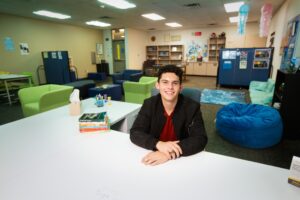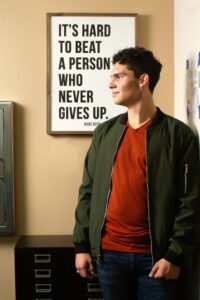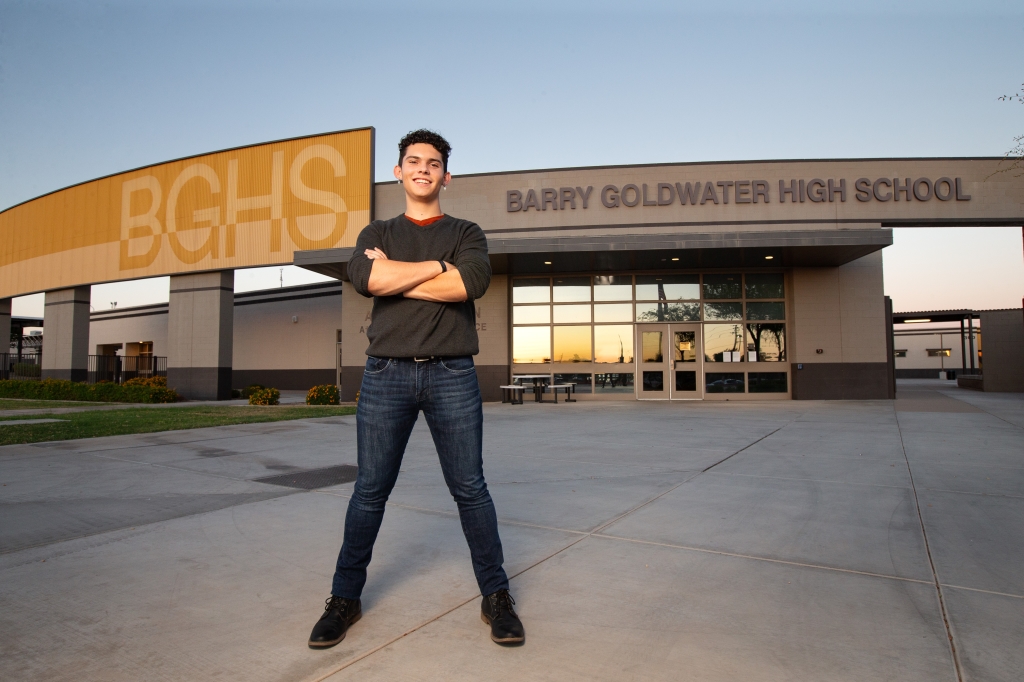Writer Shannon Severson // Photography by Loralei Lazurek
The kids are not all right. Mental health issues are plaguing young people at unprecedented rates, interfering with their family, social and academic goals. Many suffer in silence, unsure of how to relieve the anguish they experience daily, but help is on the way for local students.
Barry Goldwater High School senior Brendan Salisbury has seen and experienced the profound struggle among his peers and in his own life. He decided to do something about it and, in the process, has been honored as a 2023 Bezos Scholar, 2023 Outstanding Phoenix Youth Leader of the Year and Interact District 5495 West Valley Team Executive and Assistant Governor.
“When I was a child, I was diagnosed as twice exceptional,” Salisbury reveals. “I was diagnosed with severe generalized anxiety disorder and was gifted in the 99th percentile. Growing up, it was difficult to fit in socially; I had a lot of struggles. I had the support of my mom, who is a mental health counselor. A myriad of kids believe they’re the only ones [suffering]. I want to be able to provide equitable mental health care access and resources to kids of all origins.”



State Of Distress
Arizona’s youth struggle mightily with mental health challenges. According to a 2022 study by Mental Health America, our state ranked 49th in mental health, with more than 17% of young people suffering at least one major depressive episode. Adding to that concerning statistic, 60% of Arizona youth experiencing major depression do not receive any mental health treatment, as access is limited and even among insured patients, 10% do not have mental health coverage.
Since children spend the majority of their time in school, Salisbury saw the need to innovate positive mental health options on campus.
“I feel like schools are not set up for [mental health needs],” he says. “If you have a learning disability or a physical disability, [they] can help with that, but if someone has a mental health issue or some places where they’re struggling to cope, the school just isn’t set up very well to manage that. That became the driving force for [my project].”
It all began with his sophomore year project as part of the extremely demanding International Baccalaureate program. Salisbury was inspired by actor Glenn Close’s “Bring Change to Mind” campaign and started a mental health club.
“The sophomore project can be individual or community-based, so my mom encouraged me to do something that would help me reach out in the community,” he explains. “It is the first mental health club in Deer Valley Unified School District history. We got a lot of traction, which was awesome.”



Leading & Learning
By the time junior year rolled around, he was approached by the Barry Goldwater High School Pride, Accountability, Courage and Kindness Team, which provides positive behavior intervention support to students, about an idea they’d learned at a recent conference. The concept: a centralized place to decompress and feel rejuvenated.
“They came to me and said, ‘We want to build this but we need student buy-in,’” Salisbury recalls. “That’s where I came in. I have tons of students who are interested in mental health as a result of my club.”
With student input and a crowdfunding campaign that raised $3,000, Salisbury helped the school’s intervention team to establish both a staff and student wellness center — the first of its kind in Arizona.
This effort was a catalyst for his Bezos Scholar designation, as just the second Arizonan ever to earn the honor. Every year, 17 students and 13 educators from the U.S. and South Africa are chosen for this yearlong program of leadership development, which grew out of the Aspen Ideas Festival, where Jackie and Mike Bezos (parents of Amazon founder Jeff Bezos) attended with global leaders and wondered why there weren’t young people involved in the event.
Bezos Scholars like Salisbury and his IB Spanish teacher Vicky Muñoz participate in virtual sessions twice each month. He also attended a week at the Aspen Ideas Festival this past summer for training and networking before returning home to launch his “Community Change Project.” Salisbury will spend the remainder of his senior year planning the presentation of his project and will share a grant proposal to earn $1,000 in seed money to finance his project.
“I loved that [Aspen Ideas Festival] experience,” Salisbury says. “I learned how to make a local ideas festival and received training and now every month I receive specialized coaching on how to make community changes. [Scholars] also get personalized college and career counseling. The program is really for those who want to benefit the community. I don’t receive any money personally and that’s the unique aspect of this. I get to participate and develop as much as I can for my community.”
Salisbury is raising funds in the community and seeks to partner with local businesses and fellow students to expand and establish wellness centers at every Deer Valley Unified School District high school. His goal is to raise $25,000 in conjunction with a local charity, the Xan You Matter Foundation.



A Way To Wellness
Salisbury says that every wellness center will look different and be tailored to each community’s needs. Students, counselors, teachers and administrators will all have a say in how to best serve their individual populations.
For privacy, an online pass system allows the student to discreetly request a break from their teacher. Upon check-in, the student scans a QR code and rates their level of stress on a scale from one to ten. It helps to self-identify how they’re feeling and they can indicate if they’d like to speak with someone; a qualified staff member is always on-hand to assist, if needed.
“Students go to the wellness center for only about 15–20 minutes,” Salisbury explains. “That’s an amount of time that is scientifically proven to bring a student down from a ten to a six. They choose what resources to use. They can gather themselves and venture back out.”
Barry Goldwater High School’s student wellness center is divided into areas that facilitate varying coping mechanisms. The workout area has medicine balls to slam and yoga mats for stretching or meditation.
“When emotions are really high, there’s nothing better for me,” Salisbury says. “If I’m really mad, I’ll just slam a slam ball and it’s phenomenal because I get it out; [the anger] is just gone. That’s probably one of our students’ favorite resources.”
There’s also an area with board games, puzzles and fidget toys; a creative space with art supplies; a reading library with books on mental health; and a directory of crisis and mental health hotline numbers. Students have a wide range of coping tools.
The staff wellness center has massage and inversion chairs; a generous supply of coffee and snacks; as well as puzzles and reading materials. The space also gives teachers a quiet place away from students during lunchtime if they need some extra solitude that day.
“In Arizona, we are struggling with a high teacher turnover and retention rate,” Salisbury explains. “We are trying to take care of their mental health just as much as they’re taking care of our kids. The time they spend with kids outnumbers the time parents are spending, so we are making sure they’re mentally healthy and feel supported.”
Salisbury points out that mental health maintenance fosters community among teaching staff and gives students good role models for their own mental health journeys. The response from students and teachers has been extraordinarily positive.



A Space For Everyone
Salisbury’s next step to leave this legacy of wellness in his community is to expand to every high school campus in the district. He’s using his networking and leadership skills to get it done and he wants local businesses to buy in so that he can grow the effort beyond the original seed amount of $25,000.
“I’ve been able to recruit an interior design company to work with me pro bono and have several different nonprofits that want to help,” Salisbury says. “I really want to bring in local businesses, though. I want the communities to be involved.”
Salisbury has partnered with the Xan You Matter Foundation, founded by the parents of Alexander “Xan” Leon — a former Goldwater High School International Baccalaureate student who battled mental illness and sadly took his own life during his sophomore year at Northern Arizona University. He was just 20 years old. The foundation aims to end the stigma of mental illness, raise awareness and affirm that every life matters by providing resources, education and hope for those who battle depression, anxiety and suicidal ideation.
One hundred percent of donations to the foundation for Salisbury’s efforts will go to his project, with the Bezos Scholar aspiring for each high school’s wellness center to be not only custom-designed to serve the students but also supported directly by the businesses that serve the school’s families. The way he sees it, healthy teens and healthy families benefit the local business community, too.
“Teens who are getting the help they need can contribute in the workplace and are likely to volunteer and be good citizens,” Salisbury says. “It puts a smile on everyone’s face to be greeted by a friendly young employee or have the door held open for them by a local student.”
Salisbury hopes to attend Stanford University in the fall to earn a degree in neuroscience with an emphasis in systems. He aspires to ultimately become a physician-scientist and create his own foundation to fund neurological institutes in children’s hospitals to focus on neurodevelopmental disabilities.
He will also remain involved with the Xan You Matter Foundation after graduation and hopes the wellness centers that he is helping to establish will become a model for not only Arizona but also the entire U.S.
“This is a legacy,” Salisbury says. “I want to be able to leave something that is going to be there for generations and generations.”







Comments by Admin